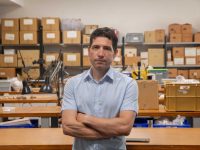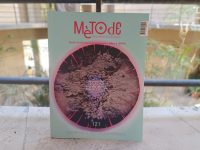
The present year, 2011, will bear witness to a variety of events. One of the most important occasions for our University will be the International Year of Chemistry, proclaimed by the UN General Assembly and endorsed by the International Union of Pure and Applied Chemistry (IUPAC) and UNESCO, in response to an initiative by Third World countries. The idea is to celebrate the achievements of chemistry as a science and particularly, in accordance with the current perception of the social value of science, to raise public appreciation of the contribution this discipline makes to the well-being and progress of humankind.
The motto chosen for the celebration is unequivocal: «Chemistry–our life, our future». The creation of an international logo and issuance of a stamp and a commemorative coin are all evidence of the importance placed on this celebration. Furthermore, a wide range of activities and institutional events are scheduled worldwide, including publications, exhibitions, conferences, seminars, courses and awards, as well as educational, informative and entertaining activities. Within this context, we must highlight the celebration of Women Sharing a Chemical Moment in Time, an event that will bring women in chemistry together worldwide, recalling the pivotal role of Marie Curie, coinciding with the 100th anniversary of the Nobel Prize awarded for her contributions to chemistry. In 2011, we will celebrate another anniversary in chemistry: the centenary of the founding of the International Association of Chemical Societies. This will provide an opportunity to highlight the benefits of the internationalization of science.
«Nowadays chemistry is a reality spreading its leafy branches towards medicine and pharmacy»
For the University of Valencia, this celebration holds a special significance, given the excellence of our scientific contribution to this field –one that also contributes significantly to the VLC/CAMPUS International Excellence project–. On considering the number of Spanish SCI papers in different fields in the last decade, chemistry holds a very prominent position. Likewise, the University of Valencia is listed as one of the Spanish institutions that excel in chemistry, among the top hundred institutions in this field at the international level. This also goes for several of our researchers, ranked among the five hundred most frequently cited chemists in the world, making the Institute for Molecular Science (ICMol) and the School of Chemistry at the University of Valencia, without doubt, internationally renowned centres for research and teaching in chemistry. We feel particularly proud of this accomplishment.¹

However, these achievements would be incomplete were it not for the value we place on our teaching tradition. As far back as the late sixteenth century, the School of Medicine endowed a Chair to Medicinal Chemistry.² The eighteenth century witnessed the creation of the Chair of Chemistry and in 1900 the sections of chemistry and physics became separate entities within the Faculty of Sciences. Chemical studies became an independent degree course in 1967, while 1977 saw the creation of the School of Chemistry, which currently figures in the CHE-Excellence Ranking 2010. The School of Chemistry offers a choice of subjects in strong demand, in accordance with the European Higher Education Area, and also offers an attractive range of postgraduate and doctoral programmes. Collaborations are maintained with the Official School of Chemists of Valencia as well as with the industrial sector; furthermore, the School of Chemistry is fully committed to and involved in activities run for high-school teachers and students.³ A particular example is the National Chemistry Olympiad, a programme run by the Spanish Ministry of Education in collaboration with the Spanish National Association of Chemists (ANQUE) and the Spanish Royal Society of Chemistry (RSEQ). This competition, which aims to raise high-school students’ interest in chemistry, will hold its 2011 edition in Valencia with the collaboration of our School of Chemistry.
«Hem de generar orgull institucional i reconeixement social, interès vocacional en els més joves i confiança en la creativitat de la química per al nostre futur»
So, given this marvellous reality of Chemical Sciences in Valencia, we can refute the previously held claim that «Chemistry is little cultivated among us: this science is but of very moderate extent even among the learned», as the Encyclopédie of Diderot and d’Alembert began the article on «Chymie». Far beyond mythology and alchemy, Albertus Magnus and Ramon Llull, nowadays chemistry is a reality –and it is here to stay– spreading its leafy branches towards medicine and pharmacy. Chemistry is essential to achieve the sustainability of natural resources, key in the search for alternative energy sources, vital for food and health, especially given the growing world population. Thus, we must raise institutional pride and social recognition for this exciting subject, encourage youngsters’ vocational interest and boost confidence in the creative potential of chemistry for our future.4
NOTES:
1. Data provided by Eugenio Coronado, Director of the ICMol, University of Valencia. (Back to the text)
2. López Piñero, 1977. El Dialogus (1589) del parecelsista Llorenç Cóçar y la cátedra de medicamentos químicos de la Universidad de Valencia (1591). Chair and founder of the Instituto de Historia de la Medicina. (Back to the text)
3. Data provided by the Dean of the School of Chemistry, Professor Pilar Campins. <http://www.uv.es/quimica>. (Back to the text)
4. <http://www.fundacionquimica.org/anio_internacional_quimica.php>. (Back to the text)





